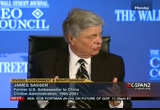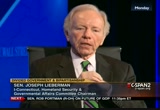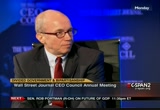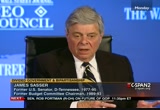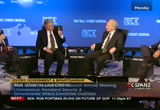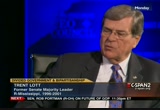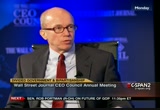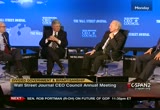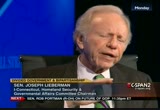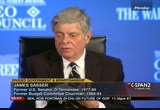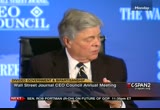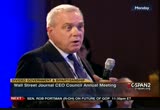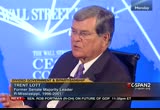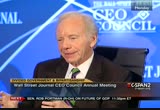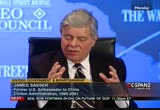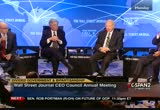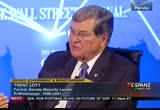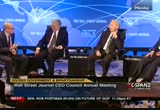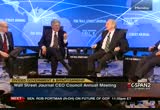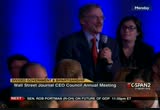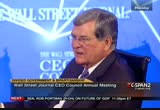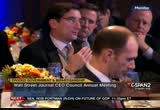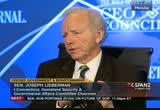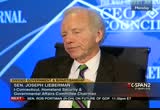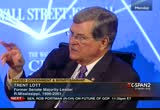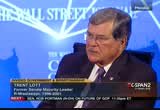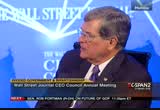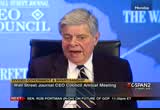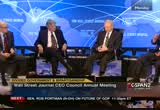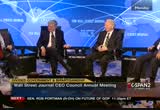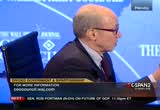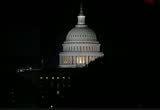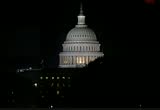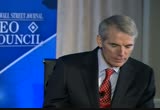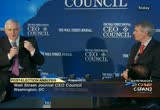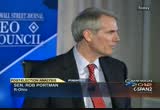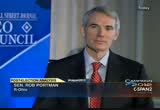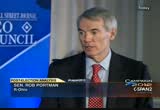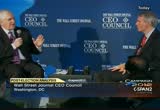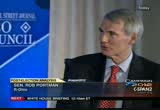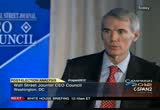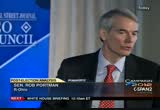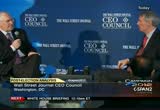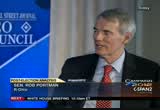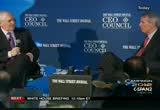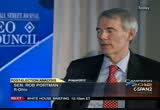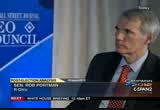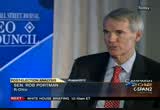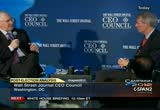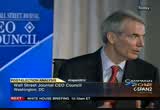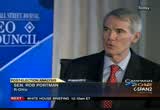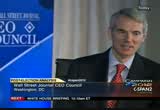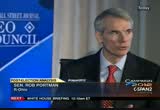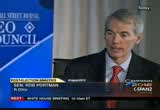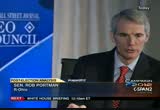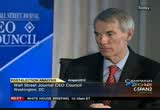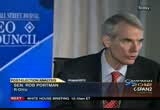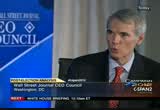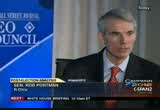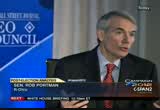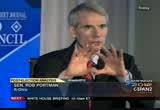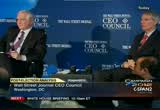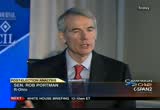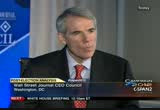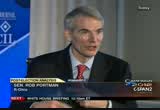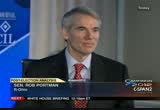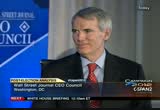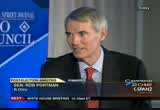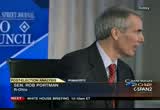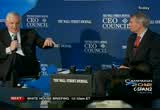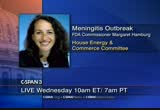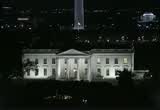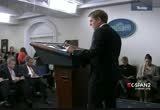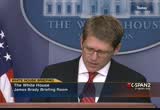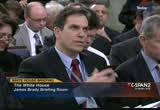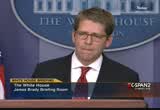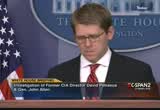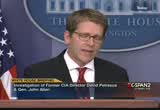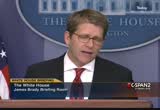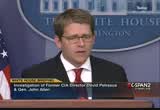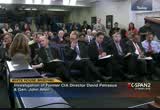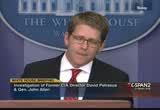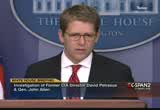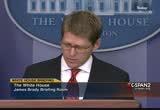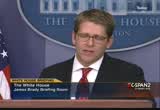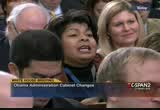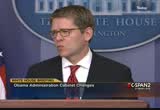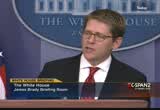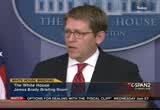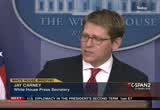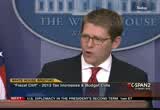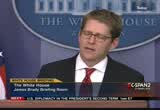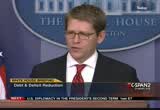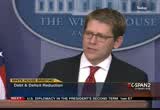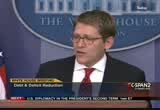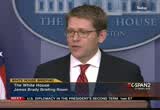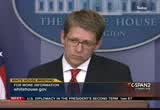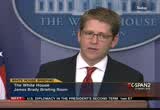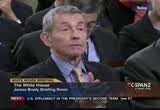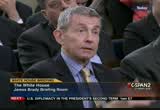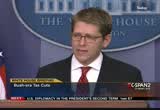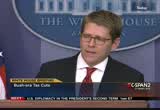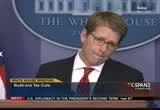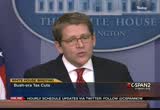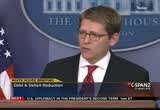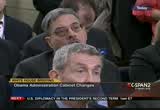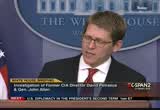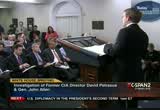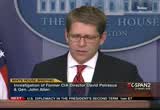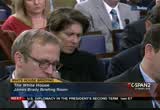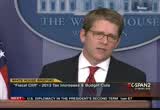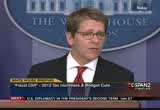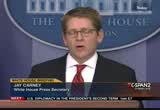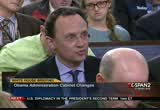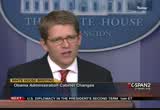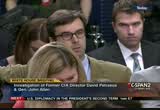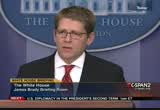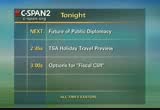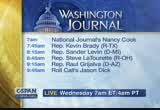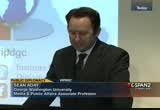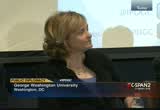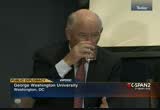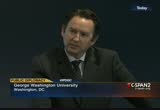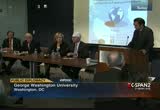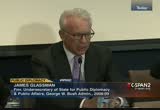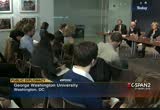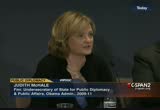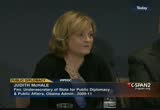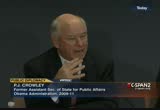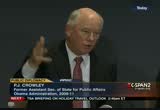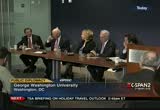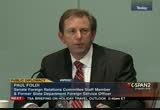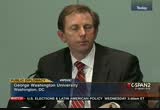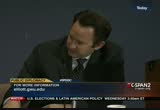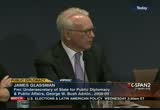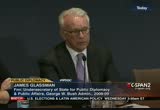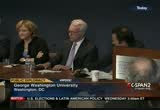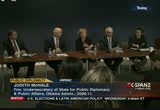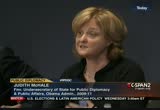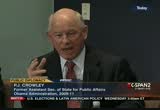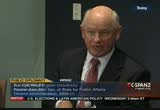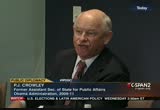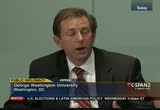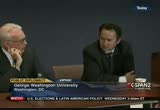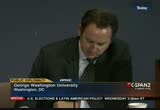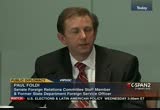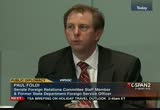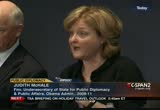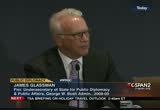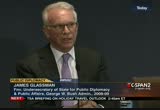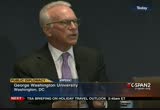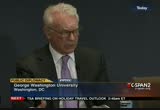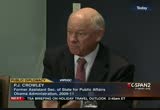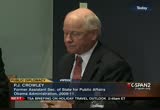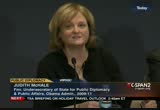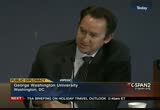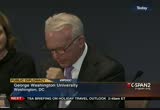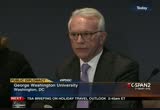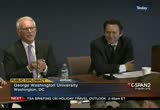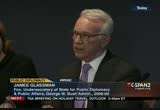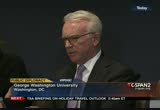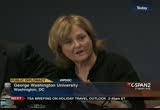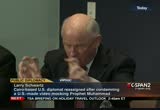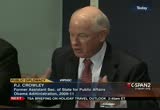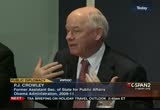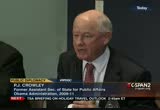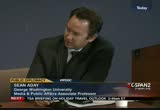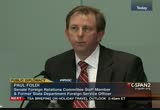tv Capital News Today CSPAN November 13, 2012 11:00pm-2:00am EST
11:01 pm
of course, welcome our approach has been a crackdown on providers. hospitals and doctors. >> but that won't do it. that probably compromises the care to the people who need it most. >> what about premium support? the kind of thing that paul ryan was talking about? a voucher type system. here is the amount of money you
11:02 pm
have, it's your responsibility to go out and buy up land. >> well, i don't think he will do that. as to visual. >> can he get there without doing a? >> i think so, but it's tough. this is increasing the age of eligibility to be more close to the actual age in which people are living as opposed to the age that they were living in 1965 when medicare was adopted. the average age was about something. now it is closing in on 80. that saves a lot of money every year. i think the president has to show the public and the republicans who are acting to support higher revenue, that he is prepared and democrats are prepared to deal courageously. >> i think you have to realize here that the president has his own constituency. and if he gets too far off of the road here, he's going to lose the democrats and particularly, the liberal democrats. if the democrats who run the united states senate, where they
11:03 pm
tried to. i saw something the other day that when lyndon johnson was the majority leader of the senate, trent, he had won the one filibuster. harry reid has had 370 filibusters in the time that he has been majority leader. so that is one of the reasons for the dysfunction, i think, this government. you can get anything done in the senate, and you can't get anything done in the house. >> jim, what i am saying, dealing with medicare and supporting medicare reform, it would give the president in trouble with some of the democratic base. but that is another way in which he has a mandate. he just won the election. if he doesn't leave them that way -- the republicans will never do what needs to be done on taxes, and we will be back to
11:04 pm
falling over the top and. >> i'm not saying he shouldn't take any risk, i'm just saying that he can't get too far off to the right, or he's going to lose votes on the left. >> but he is the president. leadership begins in washington with the president. he needs to take some risks. if he doesn't agitate his base, and quite frankly, it baynard is not agitate his base, they are not going to get a deal that will make a difference in the future economy of this country. we are in a mess. he is in a position like a lot of previous presidents. he's got to be thinking, am i going to leave a disastrous legacy in the hands of our grandchildren? or am i going to step up and lead? i used to get criticized because i was a deal maker. i talked to people like joe lieberman, we would find a way to get things done. you have to give a little to get a little. doesn't wind up getting you in
11:05 pm
trouble? oh, yes. but after all, that is what this is all about. the president has said himself, and i quoted him in an article that may run in the "washington post" tomorrow, he says america deserves better. it begins with him. mcconnell has to be engaged. harry reid has to be engaged. we are at a profit this year. maybe it is the fiscal cliff. but we have to act on a lot of really serious things and we had some of it now. we have to do a lot of it next year. if they do the right thing, that our country will benefit the legacy will be secure. so i want to open this up. a lot of people in this room are engaged in this effort, frankly in a more activist way and ceos have been engaged in anything like this in a long time. i would like to hear from some of them. before i do that, i would like to ask you a question about the election results. a very close election, but striking demographics divide what it reveals about the
11:06 pm
country. republican voters look a lot like us. mittal alias in overwhelming majorities among latinos and asians and among african-americans. among young people, among unmarried women. what does that mean? what does that say about the country? is a good thing? is it something we should be worried about? enacted so that we should do a better job. we have to reach out more to young women and there is no reason why we can't get a better builder than a hispanic community and in the asian community. >> so basically, rape is not a good campaign? >> no, that's not a good thing. my friend said that we lost seats in the senate because we had crackhead candidates. >> that hurt.
11:07 pm
>> on the most interesting numbers to me, maybe not surprising in the polls, was the president obama defeated governor romney among self-described moderates by 15 points. so this is an expression. and he asked a lot of complications complicated questions about who are they. a lot of people would say that president obama is centerleft. but it's all compared to. compared to governor romney, and i think really the republican party, including the statements that todd akin and richard murdoch made, it seemed like they were are off from the center. as an independent, i can give advice to both parties. >> ronald reagan and jack kemp -- the party of upward mobility, that didn't seem to be the republican party this year.
11:08 pm
now, maybe it was because of this very effective attack campaign against mitt romney and bain capital and 47% of all that stuff. but i think hispanics and asians -- and a lot of women, they didn't vote for the republican party not just if you are hispanic because you think their anti-immigrant, but because it doesn't seem like the kind of party that will create a country in which you are were going to have a chance to rise. it seems, by their own statement and also by the definition the democrats gave them, is a more exclusive thing. if republicans don't change that, their future is not good enough let me just say that it he would've been allowed to be out there a little bit more -- he was a jack kemp disciple. i think it's remarkable that we could reelect an african-american president with the name of barack obama at a time when you had almost 9%
11:09 pm
unemployment in the country was suffering economically. no that tells me something about who he was running against. i'm not talking about the person, particularly. i think that mitt romney was an attractive candidate. but it that tells you something about what people perceive as workers party represents. and i think it is partially defined in the republican primaries. i think he ever really fully recovered from the damaged that was self-inflicted when he was losing so far to the right and he got the general election and he simply -- he simply couldn't erase that. >> but he didn't have any choice that's right. but we saw what jon huntsman said. he was a moderate. >> there is something basic, i think, going on in the republican party that is
11:10 pm
unhealthy. it is unhealthy for the country. trent lott is not comfortable, i think, with some of the right portion of that party. >> i agree with that. >> i don't know when i became an established moderate. >> you are an established moderate. [laughter] >> let's open it up. there are a number of people who have decided to get engaged in this fight in the way that ceos of large companies have not come in the past, -- mark, maybe i will put you on the spot. will will you allow me to do that? okay. >> when you stand up please. >> two of the most important things of the ceo is to set the agenda and the power to convene.
11:11 pm
we need president obama to convene the right people together and set the agenda, which includes when the agenda is done. so the andrews air force base example. you don't amount to-month-olds finished. can we get that done? quite frankly, what american businesses are doing, they are planning a contingency to hold capital expenditures and lay people off in the potential that we will have a recession. in the bubble in washington, we determined how to keep our friends on the right or left by how we behave, the american people are the ones who suffer because we are the ones who laid them off. because we know how to respond to this situation. >> the president has to do that. the president has to meet with the leaders of the congress, collectively and individually. without the press necessarily being in the room. he heads to set the agenda. he needs to, you know, talk about what needs to be done. next year is going to be a window of opportunity which we won't have for three years after
11:12 pm
that. we could have tax reform and we could have energy legislation. but we haven't even had a defense bill or cybersecurity. joe lieberman is still trying to get a cybersecurity bill, which is really important in this country. but the president -- he is our leader. he needs to engage more than we have somebody here in the room that can talk to him. i am an incurable optimist. >> i share trent's optimism. we can't adopt the total bipartisan balanced budget agreement, but we can get started. we can have a real down payment, elise to cover the first year of what otherwise would be this cluster, which is $110 billion. and i think we can do some tax reform and some entitlement reform and pull it together. and then we can adopt a process that tries to push committees of
11:13 pm
the regular order to come out with enough savings and spending and enough new revenue as part of tax reform and long-term entitlement reform -- were not thought possible to do this and this lame-duck session -- one quick point. i usually watch fox news sunday, but i sometimes watch "meet the press." chuck schumer and tom coburn were on "meet the press" and saying the same thing. >> what about the screw? big companies, raising a bunch of money, they run a lot of ads. is that a positive for the process? >> i think it is a positive. i think business should really make their views known on us. we should go to the american people and tell them what they think needs to be done.
11:14 pm
i think it's a positive thing. if they can do it in a bipartisan mode it appears they are not taking sides with one party or the other, but it simply moving in the direction of trying to put our fiscal house in order to the benefit of the whole economy will be something that we all live off of. >> ask those that are big funders -- asked him to call the leaders of the parties and tell them it's important to them, their business, the country, he's come to an agreement on this. because they have a lot of leverage right now. also a lot of indebtedness from the two political parties. >> anyone else want to jump in? do have something to follow up
11:15 pm
on? >> we have a gingrich kind of deal, 20 points, @-at-sign committees, deadlines, this doesn't happen, simpson-bowles -- they can get ugly. >> you may be aware that there is an effort underway to do just that. lamarr xander got out so that he could do something just like this, he is working with the democrat from colorado with the least the knowledge of mitch mcconnell and chuck schumer and probably harry reid, too. they are going to go to the leaders and say that we propose that you kick the can down the road of next year. but by certain dates, we are expecting you to do certain
11:16 pm
things of the ways and means and finance, and if you don't, simpson-bowles -- simpson-bowles is going to have to be tweaked a little bit. and a former senator from new hampshire, and i think edmund delle, they are working on a group called fix the debt. what they are doing is -- simpson-bowles was theoretical. it really never was flushed out in terms of language, and did not do enough in the entitlement side. so there is a document that would actually put dates in requirements and say, by the way, you're going to be faced with simpson-bowles plus. the problem is that's what this question was. >> my first job in washington was working for a magazine called the congressional quarterly. unlike a kid, i went out and
11:17 pm
studied all the rules until somebody took me aside and said there is only one rule that you need to know. and i said what is that? and they said congress can do whatever it wants to do. and i can't force that. >> they all require budgets every year. budget resolutions. they haven't done. to make it work, it's not a guarantee. that's i think it's important in the lame-duck session to actually adopt spending cuts and do some stuff. >> yes. >> the second thing is, the sequester his death. that is why no one would want to accept that in a single shot. i think the next time around, it has to be a slow death. not exactly death in one shot, but across-the-board cuts in spending and tax expenditures this year, by october 1, if congress doesn't adopt a balanced budget plan. if congress doesn't change it. >> yeah, that's the problem.
11:18 pm
so it will create a disaster, but it's going to hurt. and that will happen -- it will keep happening. >> that was what was successful about 1990. you have enforcement mechanisms that did hold for a few years lease. >> yes. well, alan, i don't recall the enforcement mechanisms things that important. as i recall, what made us do it was simply -- we were frightened about the size of the deficit coming out. and we had sequester and we would always sort of, we would come kind of kick the can down the road. >> we did have a sequester when you're in a where is my blog and? you were part of this 1990 deal. >> i wonder if you could -- what is your perspective on?
11:19 pm
>> i think you're right that the enforcement mechanism was actually right. one was like spending was limited to a specific dollar amount and could not be exceeded. and omd have very tight enforcement procedures. so they had targets and productions of deficits and so forth. the other was there was a marginal balanced-budget. and if you want to add a new entitlement, you had to cut spending somewhere else. it's kind of like the margin of that, dealing with the debt deficit that exploded from them. both of them worked pretty well until the late '90s. soon the budget started doing a surplus and created a lot of tax cuts. >> partly because of the danger -- we have the danger of huge surpluses. >> in any event, the discipline
11:20 pm
got lost. but it was re-upped by the republican congress several years later. another key part of it but didn't get enough attention, and a big part of why george h. w. bush ended up going along with it, was that he was able to wolof defense spending for several years and following the fall of the berlin wall come he was very worried about your coding and cuts in defense spending that were being proposed. >> incidentally, that will again be important. >> i think it's important subsequently, but also important for bipartisan agreement. that is one of the givens that democrats seem to be more focused on his first offense goes. >> the deficits were really small compared to today.
11:21 pm
the next thing i would say is that with this essential debate in the election, it had been an issue, but it hadn't been a center of it was. specifics have not been as central to the 1988 presidential election as it was the recent presidential election. and that, that has some importance as far as dimensions go. in the last thing i would say is we really have three problems right now. we have the short run fiscal cliff. the medium term needed to consolidate all of simpson-bowles. and entitlement cost crisis, which is part of the term that is growing worse.
11:22 pm
and besides, they are going to jockey for a while about trying to get their terms in all of those come and i think it would be harder to get the fiscal cliff don't let in lame-duck session and some people propose. i hope i'm wrong. that is a big concern. >> one of the things i used to say to tom when he was a democratic leader, they used to say that if we do the right thing, there will be political benefits for both of us. that's what happened. we made these tough agreements. quite often it benefited us, the republicans. then in 2002, it benefited the democrats. >> wait a minute, the senator lost his job. [talking over each other] [laughter] >> it didn't work out for everybody. >> no, it didn't. but the solution to this is very simple. joe lieberman is going to be in his last six weeks is an
11:23 pm
independent senator and i believe that he can help get a result in lame-duck session that will be good for the country next year and going forward. [applause] >> i will try my best, that's for sure. >> there were some other people part of this coalition. bob, can i give you the microphone and get you to explain. you have your traditional groups. you have other groups. why this? >> i think the answer is pretty straightforward. the dimension of the problem is a large extent and it needs the full attention of the business community and any other business organizations with intention of multiple purposes. this is meant have a short lifecycle and the focus. and i think it came together by
11:24 pm
business people who make deals all the time, not fundamentally understanding how the president who commissioned simpson-bowles just disregarded the work from the work product. so i'm certainly interested to understand how that happens and how you put a commission together and you could argue that more of the intellectual content was coming from your side of the house from the democratic side of the house. i think that was probably the touchstone of the business community to say that it's just not something -- we can't really believe it then we have to put this focus on its. >> why should we believe that it happened this time? >> well, because we are getting close to the fiscal cliff. >> one problem is a sluggish economy and the other is the
11:25 pm
national debt. the truth is the best thing we can do is solve the problem. because that will create uncertainty about the future that will allow people to begin to spend enormous sums of money that they are sitting on. you know, i think that we are one big fiscal bargain away from stimulating our economy in a way to continue to have economic leaders of the world for years and years to come the international agency of energy, not us or -- they announced that in 2020 the u.s. is going to be the number one producer of oil in the world. for all of our troubles, the
11:26 pm
drag is us. >> shame on us for that. [laughter] [talking over each other] [talking over each other] >> all right, we will be expecting that. >> this is not the first time that the work was ignored. >> they recommended getting rid of a lot of the tax credit -- and end the recommendations disappeared. [talking over each other] because i'm looking for my commission report. [laughter] >> he started going back in the president's desk. but simpson-bowles has had more
11:27 pm
staying power than a lot of commission reports. it is a guideline and it is the next iteration of simpson-bowles. it is clarification and bottoming. it is valuable. we are at a crux, a breaking point, frankly. with the future of this country. i think something has to be done in lame-duck section and i think that things will be done. and then we need to deal with the longer-term issue next year. the groundwork is laid. president, john boehner, harry reid, and senator mcconnell -- you can't do in three and half weeks a half weeks what needs to be done. the next year is that moment of
11:28 pm
opportunity. and i think the work is being done and i think this will help get a result. >> when he does come back and say, i was disappointed when the president come after simpson-bowles, didn't really embrace it and i don't know that we would've adopted it, but it would have been the least possible. it is because the president has been reelected after a very tough campaign. the republicans have been upset by the results of the campaign and you have the raw personal material for this to work out to everyone's benefit. he is very much smart and very effective. >> inner has to get the votes. he calls for both it only gets a vote on his conference committee has problems of his own.
11:29 pm
11:30 pm
passed after they -- after the market tankedded, and then you had the same crowd, pretty much the same crowd, putting full faith and credit of the united states government on the line on the debt ceiling, and they would not deal with it. they wouldn't deal with it. we saw our bond credit rating go down. that sort of wrecklessness and that political immaturity i think is exceedingly dangerous, and i don't think we're seeing that much growth of maturity in many -- in many members of the congress and many members of the house of representatives. >> john boehner put together the agreement that got the debt ceiling raised. he lost 26 members of the conference, but he got it done. he put his neck on the line. >> after we had the problems. >> that's true too. i had an experience with debt
11:31 pm
ceilings myself. all the years that i was in the house, i voted against every debt ceiling increase from 72 to 82, and then i found myself the republican whip, and reagan was president, and the president said you got to pass the debt ceiling increase. i went to the floor of the house, made a speech about how this is a credit card, we have reached its limit, but i voted for every increase since then, democrat or republican. i don't like it. it is a way to get leverage, but the problem is not the debt ceiling increase, but taking action so you don't have to have the increase. >> absolutely. absolutely. >> let me -- very good, helpful, history lesson there. i want to do housekeeping before i let you go. when we finish here tonight,
11:32 pm
we're going right outside this door for cocktails, chocolate, and cheese. tomorrow morning, breakfast promptly at 7 a.m., and the program begins at 7:35. be in the room at 7:35 tomorrow morning. most important times tomorrow as you think about the schedule, i know we lose some of you occasion noel lay during the day. the task forces start at 10:15, really need everybody in those task forces because that's where the core work of the council is done. the report backs and final vote sort work of the task forces happens from three to four, and then secretary geithner will be here at four o'clock. keep those -- keep those times in mind. a shoutout to our partners, thank you for supporting us, and
11:33 pm
11:34 pm
11:36 pm
>> romney's finest moment in the campaign. the first debate, so, thank you very much for being here. our title today is the future of the republican party. this assumes, of course, it has one. [laughter] let's start by talking about the election. you played a crucial role in ohio, and i want to get your sense of we're now seeing reports -- use this one?
11:37 pm
sees reports that the campaign was surprised by the outcome, even right up to the evening of election day because their polls were showing something different. your polls showed something different than somebody else. is that true? how surprisedfuls the campaign? >> first, it was a very close election in ohio, and ohio was one of the key stytes. even if we won ohio, it would have gone to president obama. lost by two points in ohio, and i recall back in 2004, when john lost to george bush, he said both publicly and to me on the floor of the senate, and half the people who fit in the horseshoe, i'd be president today, it was -- it was a very narrow victory. i do think there were some reasons that are almost technical, and folks here are
11:38 pm
good at social media, and their turnout efforts on the democrat side were effective. if you look at the numbers after the fact, the turnout for democrats among their base was better than we expected, and i would say better than they expected based on their polling and their sampling. they did a better job than we did. mitt romney got fewer votes than mccain in ohio, and came within two points. the technology included the so-called system, which was the republican get out the vote technology to ensure we targeted people to get to the polls. that imploded. i'm told on election day, actually, so many hits from around the country as it should have saying, gee, this person voted, this person didn't, target calls, thought it was under attack, and closed down. for those of you here from,
11:39 pm
again, the technology field with the politics, we, republicans, want to talk to you. [laughter] we need help. the democrat system is calledded gordon, it was effective at microtargetting, and i heard a lot of antedotes, and you'll love somebody gets a call who is a democrat in law school, and it was gee, you know, we see that you have voted, this information is public available. we see you voted at two o'clock on election day, but your sister, at two lane, has not voted, could you call her? that's the level at which they were dealing, whereas, you know, we were flying blind at that point. part of it is technology, and part of a turnout that was impressive on their side that in the end made the difference the increase of turnout among the base, the democratic party is that two-point difference. second, paul talked about this,
11:40 pm
that i think that, and take it to the level that thought they made a difference in their lives and families, and this is something that folks in this room are either non-partisan, democrats, or republicans, but i hope you agree there's things to do in the economy that are growth oriented like tax reform, regulatory relief, and other things talked about in the campaign, but i think we had a difficulty convincing people who were more independent voters who were not on the republican or democrat side. this is not a turnout issue, but dealing with the independent voters, those in the middle, enabling us to convince people this makes a difference in their lives. >> but on that point, what was the failure there because clearly that had to be one of the core focuses of the
11:41 pm
campaign, reach those people with that message. was that a function of the misguided strategy on the campaign or just a failure to put it, articulate it in the right way by the candidate or overall campaign? >> i think it's both. third element first, the third element, of course, is we were outspent. outspent early on, and although there were not adequate resources to address every issue, some issues were allowed to remain unaddressed and those cam bane to hurt us in the end because in may, june, july, august, we were outspent in ohio 3--- 3-to-1, and if you're watching tv, and in columbus, ohio in that time period, there were negative ads, almost all negative, quite effective, about bain, the auto industry bailout, and they were, you know, about policy proposals that were mischaracterizing mitt romney's
11:42 pm
policy proposals, but effective. that he would raise taxes on middle class for instance. we can't forget it was not a level playing field until really the very end, until after the convention when the general election funds were available to mitt romney which he needed to respond. we were not in all the markets in ohio. we were being outspent, and so that has a cumulative effect. it's difficult. i chaired ohio, and i'm too focused on ohio, but the same is true in the other swing states. it's tough to come back from there, but back to your question about, you know, how do you take policy issues and translate the way people care about? i think it's a huge challenge for us, and, again, i would suggest a loft people in the room share that challenge to the extent of forgetting partisanship here that you believe in policies that lead to economic growth, more jobs, and i think sometimes you find among employees it's tough to communicate it. i'm a former trade representatives, i'll use trade as the example, but i suggest that many of you depend on
11:43 pm
global trade and, in fact, one of my lunch partners talkedded about the revenues his company gets from global trade, and for most companies now, majority of the revenues come from overseas, and, yet, many of the employees in the same businesses are very fareful of trade and opening new markets having trade agreements, much less dealing with complicated issues in trade. that's the example where we share the challenge of how do you explain to people that, hey, this matters, and put the partisan hat on for a second and say even in the fiscal cliff conversation. you know, talking about raising taxes on folks who make over a certain amount, necessarily bringing in small businesses, entrepreneurs because it's a reality in the system, and how do you explain that to people? it may not affect people in the room in terms of who business is because you are c-corp.s, but that affects business because you're vendors, and the economy
11:44 pm
is something you care about. how do you explain that to folks in a way they understand it affects them and their families? a lot of discussion about these hispanic vote, african-american vote, i agree with that discussion, but it's part of a larger issue. it's how do you explain to folks when you get 8% of the vote, less than 30% of the hispanic vote, you have great opportunity. [laughter] >> that's one way of putting it. [laughter] >> yeah. >> that's how you look at it in terms of market share if you were -- >> because, look, a lot of people who are african-american or hispanic share beliefs that i was just explaning in terms of economic growth. they are small business people or work for a small business. you know, there's a great opportunity for us to explain this in a way that is accessible and incluesive. it's an opportunity, actually. we were not successful in doing that in 2012. >> just to pursue the minority
11:45 pm
question, and it's fallen for three cycles in a a row from 44 to president bush to 27 this time. and it's the asian vote from 24 in 2004 to 26 this time. what is it that you -- i mean, what's your diagnosis of that? is immigration actually an issue? a threshold issue here that the party needs to change on, for example? is it -- is it the size of government question where these folks are looking for government to play a more active role. >> if you look at the exit poll, it's not a size issue. i really don't. in terms of the hispanic and african-american voters who care about small business and growth, you know, it's not that nay are
11:46 pm
looking for government to solve the problems. it's still a center right country. people identify themselves. i do think there was a translation problem here, but to say it's an exclusive party, and they do affect you and your family, and it's not about wall street, but main street, nothing against wall street, but it's about the economy in general. i think there's immigration policy issue that needs to be addressed, but that's just part of it. it's about who the spokes people are -- >> your convention was simply loaded with minority and women spokesmen, every evening, loaded with them. >> yeah. not many people watched it.
11:47 pm
i mean to be honest, some say the storm, and sandy may have had an impact, i don't know that it's -- voters who decided in the last seven days, barack obama won a majority. which was a huge surprise to political scientists around the country who will tell you where you have an incumbent and challenger, the challenger picks up the majority of the last minute voters and so-called undecided voters because they are not happy with the status quo, but wait until the end to decide. in this case, they broke for the incumbent, and sandy probably had something to do with that, but, look, i think it's a matter of policy. it's a matter of outreach because people speak for the republican party, and timely, it's a matter of tone. in, again, making people feel
11:48 pm
that this is not just an exclusive party, but the policies are inclusive, and we were just not getting it to that level. >> do you think the comments by the senator candidates akin, and did that affect polling you saw for republicans broadly? >> yes. [laughter] >> the final numbers, i think, are not in yet, but it will probably be comparable to 2008. i'm not saying it's growing, but it is a challenge we face as republicans. i think those comments exacerbate that gender gap.
11:49 pm
>> extraordinary because the gap comment by a senator like that would not have echoed through the national -- >> that's true. what i say today could have an impact on what happens -- every gathering, every fundraiser as we saw, and everything is now subject to being repeated on the web, and controversial comments spread like wildfire, and candidates need to be aware of that, and frankly, in 20 # 14, where republicans have another opportunity on the senate side because there are -- let's see -- 20 democrats up for re-election, and i think ten republicans, you know, there's another opportunity here, just clearly based on the numbers to try to ob tape a majority, pass budgets, and do reconciliation to get it done, but we need candidates who just don't have the right policy positions, but are aware of the fact that these
11:50 pm
comments, you know, can determine not just their election, but we saw that with regards to the missouri comments. >> are you going to run? >> yeah, no, i'm focused on the policy side right now. i think our country's in trouble, and i know there's a lot of smart people in the room who are perhaps closer than i am to how you're going to react what we do here in washington. certainly, you'll talk about that during the conference, but i think the focus right now has to be dealing with this fiscal cliff, and then putting a competitive agenda in place for the country, and if we don't do that, i believe that we will not be able to get the kind of economic recovery we all hope for and that we lacked over the last few years. >> let me ask another question. i want to get to the agenda, but i want to address at least one more question about the campaign and the republican coalition, and that is young people.
11:51 pm
a lot of discussion in the press the last -- the last week or so that you didn't make as many end roads as you thought you would with voters under 29 despite the fact a lot live at home, there's not a great job market for them, and the president won 60% of that vote. is this a cultural issue? is gay marriage, for example, a threshold issue now that makes the republican party out of touch with those voters, and you have to change that the way the republicans talk about the issue? >> yeah. [laughter] >> >> it was a close election as i started off with, and that's something we have to keep in mine. i mean, every time an election
11:52 pm
is won or lost, that's the end of the republican party or democratic party. it was a close election. the country's divided. look at just the turnout issue we talked about earlier, a technical issue, explains results in ohio and florida and perhaps virginia. the reality is, you know, a party that gets less than 8% of the african-american vote, 30% of the hispanic vote, and less than 40% of the vote coming up through the system, you know, it's a party that needs to adjust, and i talked about that today. some of the policy, a lot is tone, a lot is just an inclusive message taking what i think is our strength which is our positions on the economy and growth and opportunity and translating that in a way that young people, in this case, understand it and appreciate. getting out of school, you're looking at a 50% unemployment rate in terms of matching your degree to the job that you want. i mean you'd think that is a
11:53 pm
huge issue and the debt and deficit would be a huge issue, it's now $55,000 for every young person out of college and all of us. they were issues we could not communicate in a way that was effective, clearly, to win the majority of the vote, and the social issues are important to that generation. they look at issues differently than our generation. it's a different attitude now. you have to acknowledge that and deal with it p on the phone: did -- >> does the president have a mandate to raise taxes? they told steve moore last week he does not believe that's his mandate. >> uh-huh, well, look, as you know, i'm a fierce advocate for tax reform and competitiveness,
11:54 pm
and america is falling behind because our tax system is antiquated and inefficient. there are ways to fix it. every other develop country+n0 transformed, reformed, lowered rates -- >> [inaudible] >> we have not touched it since reagan, really, but we have done kneeing to touch the rate or reform the code. all of them have. 16.5% to 15.5% which you are aware of because you do business there. the flow and investment and people follow countries that have a more competitive environment, and taxes is one of them. reform the tax code. when you do that, you get more revenue. guaranteed almost. i mean, it's, again, it's as i said earlier, there's opportunities here, and this is an opportunity for us as a country, and as you look at the budget analysis, joint tax
11:55 pm
committee analysis of what tax reform could be in terms of economic and growth, i mean, all of them will lead to more growth whether it's corporate tax reform or individual tax reform. >> right, but if the president insists, said last friday, he said this was fought over in the campaign, and we fought over tax rates, rising tax rates, he didn't use the word "rates" himself, but the press secretary said the president would veto any bill that extends tax rates. if he insists rates go up for those making over $250,000, what would your recommendation be to the republican congress in the senate? >> working in two white houses, i believe a president has a veto over the press secretary, thank goodness, because i like the president's comments better than jay carney's comments. i think he was behind the curve on that, i hope, because, look,
11:56 pm
it makes no sense to take the inefficient code we talked about to create more disincentives to invest and create jobs. i tell you, i would be very concerned about that. i'm a huge advocate of tax reform. what's that mean? that means that while you lower rates, you do things in terms of preferences in the code, and this is deductions, credit, and exemptions, making the code competitive, allocates efficiently, economists, left, right, center, looking at one right now, agree that the current code is inefficient. senator, thank you. look, it's a great opportunity for us, and that's where we ought to be headed, and for us to say, no, instead way we do is take the current code, os fied code, antiquated code, lop taxes on top of it when 50% of the income is paid for by a pass through entity deciding will i
11:57 pm
add more people as economy shows life, plant, equipment, will i make that investment, take that risk? will i pay more to uncle sam? that's how companies work. i'm an investor, a small business owner myself. i group up in a company like that. it makes no sense. i hope he says the analysis of the past week, talking about us losing 3 million jobs next year if we don't deal with the fiscal cliff, 3.4 million to be exact. look at the analysis from young saying that that one provision alone is 700,000 jobs lost, and say, you know, just as you said two years ago when the economy was stronger than now, economic growth numbers stronger than now, it makes no sense. why do that? >> because white house economists don't believe tax rates matters in the way that you just said. >> they clearly matter. i mean, there's an honest debate about how much they matter compared to other things, but if you're goal is deficit reduction, which i love, and as you know, i'm a proponent of it,
11:58 pm
proposed a balanced bmght as the omb directorment i think it's important. if you believe in that, look at what this tax increase does to the economy versus the receive dis, it's hard to argue it makes sense economically. i'm not saying we won't have this discussion and eat, and who knows at the end of the year what happens and this year, but i'm hopeful we look at it honestly, and, look, if you raised taxes on small businesses, and to those on the top rate, less than 10% of the deficit. it doesn't close the gap much. in terms of the difference between the surpluses and deficits we had, over the last decade, by the way, you hear people say it was it was the bush tax cuts in 2001 that caused the deficits, 4%, that's a cbo number, not mine, cost 4% of it, even if you assume there's no economic growth associated with that, which i
11:59 pm
don't assume, but assume you take that point of view so we need to feel with the issue honestly. i think what we ought to do is say, okay, let's do tax reform, set a date, and i like six months, it's aggressive, ambitious, but i think july 4th is a nice day to do it which is independence day. make a commitment now. we have the current code in place for six months, at that time, tax reform and entitlement reform to deal with bigger issues that we have to deal with, but in the meantime, make a down payment. the down payment should be spending cuttings that deal with the sequester, at least for the six month period, not easy to do because i think they have to be done in this year, not the tenure people talk about, but that would be in the neighborhood for a year, about $110 billion for six months, somewhere between 50-100, make that down payment now, let's have a six month period where congress actually does its work, stay in session in january when we normally don't. do this work through the normal
12:00 am
process, and let's come up with the tax reform that pretty much everyone agrees to in general, but several's in the detail, and reforms that have to be done to save the country. if we don't deal with the problem, we've done nothing to deal with the debt and deficit and, let's put congress on the spot. some say it's kicking the can down the road, others down the road in a way that's too short. my view is i think congress can do it if they put their mind to it, and the president needs to be brought into this. a problem with the soup committee on which i sat, not so super turned out. [laughter] >> you get all the thankless jobs. >> yeah. i was ironman, and on the super committee, we each got a soup -- superhero attached to us, and iron man got rusty in the process. it was very disappointing, but the reality is the president did not weigh in on the issue of veto threat immediately upon the
12:01 am
first meeting. gave the democrats no cover. he showed no leadership. he didn't help us on tax reform, entitlement reform. he needs to be a part of the process. that makes a difference. without leadership, it won't happen. it never has. if the executive branch doesn't show leadership, it never happens in terms of things that have to be done. >> opening it up, questions here. yeah, martin. >> you said america is a center-right so -- >> in terms of economics. >> in economic times, particularly with a presidential electorat. >> when you ask the question, are you a liberal, moderate, or conservatives, most are moderates or conservatives by far. the number of liberals, i don't know -- >> it's about the mid-20s. >> no higher than the previous time the question was asked. you know, people don't consider
12:02 am
themselves to be liberal, but moderates or conservatives. that's where we are as a country. what do you think about, you know, the role of government? the size, the scope of government? for all of the, you know, hand wringing by colleagues in the republican side that, you know, we've lost the country because so many people now want to be dependent on government rather than the private sector to create opportunity, it's not true. yes, when people have a hard time, they would like to have help, but they want a hand up, not a handout. that's the american ethic. people are willing to work. yes, they believe there ought to be a fair shake for hard work, get a reward, but that's why it's a center-right country. my state is a center-right state if you ask what they think. we were not successful, this last go around, in, and they
12:03 am
were precisely that, not a radical departure, what they portrayed, but having america but true to the values that made us uniquely capable of creating opportunity and wealth, and private sector job growth and relying on government not to create jobs, but create the environment for success, and that's where we were not able to translate it. i believe this is a center right country despite results of the election. >> yes, sir, right there. >> yeah, senator, quick comment i'd -- thank you, to kind of comment back to me on. i agree. i believe we're a center-right country. i truly do. i don't think the perception is
12:04 am
out there that the republican party is a center right party. the far right scares people more than the far left, not that either one are good, but i think on balance. i have four daughters, plus or minus five years minus 30, were conflicted on how to vote because of the perception, and as we talk about the future of the two party system, what your comments would be on that. >> i agree. daughters are that demographic they look to and got a call from who knows, probably joe biden saying have you voted yet? we love you. [laughter] god love you. [laughter] no, you think yoir right. that's the perception they have,
12:05 am
and how do you breakthrough? that's the challenge we have, and for your daughters, they are in their 30s, not teens, and 20s as mine are, social media's so much more important to them. it's not just how you reach voters, but how do you reach people where they live? for young people and, you know, a lot of seniors for that matter, you know, they are online, and we were less effective at communicating not just policy proposals, but the other side was effective in taking comments made in missouri and having them to be around the country within hours or minutes. >> yes, sir in >> senator, my question about this is this. it seems to be -- it seems to me
12:06 am
the policies you have identified as maybe needing change might have been the policies that were adopted as a necessity to get through the primaries. how do you think the primary system can change to allow a candidate to come through that might represent the center right as opposed to the far right? >> uh-huh. >> because it seems to me in the last election they said governor romney was the center of the candidates, but had to pass through the primary system. how can that be adjusted? >> yeah. i pick on the democratic and republican side. there was talk about that, and until you go to a national primary, which no one is talking seriously about, you're going to have this issue. i was with somebody last night who said there is some iowa republicans who were recently meeting saying, gosh, we got to be careful that people won't even come participate in our
12:07 am
caucus system again to be sure it's broad, you know, get people involved so it's a broad spectrum of the republican party, and that's state-by-state to the center of the caucus system, a self-elected system, be careful people broadly represent the party, but, no, primaries are going to continue, the vetting process, this go-around, the president had no opponent, obviously, and he was free to have a rose garden strategy at first, but at the same time, pull mel mitt romney. you recall in the primary, herman cain was going to be the candidate, rick perry was going to be the candidate, newt gingrich was going to be the candidate, rick santorum was the candidate, and michele bachmann as well. it was just so up and down, you know, that's part of the way the
12:08 am
democrat system works going state by state and fight for it. there's benefit to that. every voter in new hampshire got a perm visit with mitt romney, michele bachmann, herman cain, it forces you to do that, but in a primary, you wouldn't have the opportunity as a voter or the candidates wouldn't have that challenge to have to be in the town hall meetings and go through it. there's good and bad parts of it, but, yeah, it does create some challenges, no question. >> on the super packs on the republican side spent over $700 million, something like that, and it looks like, you know, aachieved almost nothing in terms of electing candidates that they targeted so where does that leave that system, and what
12:09 am
does that say about anything? it's a pretty stunning outcome. with that much money with no return on it. >> a couple thoughts, one, you help me op this because there's an editorial about it or somebody wrote it for him, he's too important to write his own anymore. [laughter] it was about the fact that, you know, there's a lot of discussion now about what citizens united meant for the campaign and the super pacs, and top ten outside groups involved, the ones that were more pro-republican or romney comprised three, and overall, the spending was more on the other side because unions are allowed to take dues from members now and use that to influence people outside of the union membership so just so people understand these context of the question, and they were
12:10 am
spending more, is that accurate? >> the unions made better advantage of the super pac money channeling it into organizing and voter turnout opposed to the advertising, and then the other big issue was obama's advertising in july, may through july, which nobody responded to which, in my view, defined romney in very negative terms. >> it did, and as i said earlier, once you are defined, it's tough to unravel that. to the point, it probably did make a big difference because if the super pacs had not been out there on the republican side, the others would have been out there anyway, and so you would have seen a country that's not so evenly divided probably because both turnout in advertising glairs would have met larger margins for them. in the end, mitt romney lost, yes, but that doesn't mean it didn't make a difference. i will say that when you can want coordinate between a campaign and someone else helping you, sometimes the ads
12:11 am
are less helpful. [laughter] some adds good, others not. some were off message, you know, and in your business, think about it with marketing efforts, if you had to have a marketing team within your business, but also an outside marketing team, you have no control over and couldn't communicate with, you know, how would you feel about your results? probably not very good because you want to be able to target it and, you know, develop your message appropriately, and there was srb i'm not saying it was -- it was not without impact, it had impact. it had to be run through the campaign, and have it be consistent with the campaign's message. >> all right. i'm told that that is the end of this session, but one bit of housekeeping, december -- december set --
12:12 am
dessert and coffee downstairs where we had the meetings outside of the session, and we'll meet promptly again at 2:30, and i want to thank senator portman in particular for coming. it's been great to have you here and taking your time at what is not the most fun kinds of questions to answer a week after the election so thank you very much, senator. >> thank you.
12:13 am
12:14 am
former cry directer petraeus. allen denied any wrong doing. tuesday's briefing includes the president's deficit reduction plan discussing what labor, business leaders, and members of congress this week. this is 45 minutes. >> okay. good afternoon, ladies and gentlemen. thanks for being here. i have a brief statement to read at the top which is that today the president was able to continue returning messages of congratulations from his counterparts around the world, and in each call, thanked the counterpart for friendship thus far and expressed desire in
12:15 am
cooperation in moving ahead. the president spoke with president karzai of afghanistan, prime min stir in italy, king ab dull la ii, and president putin of russia, and the president of spain. with that, i'll take your questions. >> jay, thanks. a couple questions about the scandal that many of us are now covering, one specific and them a bigger picture one. general al help, learning more about questions about him, and the pentagon investigation, alleged behavior. does the president have faith that general can continue to lead the war in afghanistan during this critical period of time while under investigation? >> i can tell you that the president thinks very highly of general allen and his service to the country as well as the job he's done in afghanistan. at the request of the secretary
12:16 am
of defense, the president put on hold general allen's nomination as supreme allied commander of europe pending the investigation of general allen's conduct by the department of defense ig. the president remains focused on fully supporting our troops and partners in afghanistan that general allen led so ably for over a year. the president nominated general dunford to be the next commander of isaf reiterating comments that they should act swiftly to confirm him. >> accurate to say the president has full faith in general allen? >> he has faith in general allen, believes he's doing and has done an excellent job at isaf, and i refer you to the pentagon for the process underway with regards to general allen. >> taking a step back, just a week, and we've seen the cia director resign under pressure and disgrace over the scandal,
12:17 am
and we've seen the leader in afghanistan imp kateed in this. what is the president's reaction to this? discussed? embarrassed? what should we know here? >> well, the president was certainly surprised when he was informed about the situation regarding regime petraeus on thursday. he greatly a appreciates general petraeus' remarkable service to his country, both in uniform and at the cia, and as he said in the statement, his thoughts and prayers go out to both general petraeus and holly petraeus at this time. you know, he's focused on his policy agenda, and he has confidence in the acting directer at the cia, and he has confidence in the military to carry out the various missions that he has asked them to carry out. on specific individuals and
12:18 am
matters pertaining to the recent revelations, i refer you to the pentagon and ig on the one hand and to the fbi with regards to general petraeus. >> but he's not, i mean big picture watching this, shaking his head saying, guys, we need a more sense of leadership here? >> he's not going to make a grand pronouncement or decisions about things based on, you know, two situations, two individual cases. he's focused on the missions that the military's tasked with carrying out and the cia and the general intelligence community tasked with carrying out, and with acting overall agenda which encompasses not just national security policy, but obviously domestic policy. >> thank you. >> yes. >> jay, has the president spoke
12:19 am
to general allen directly? >> not that i'm aware of, no. >> spoke with secretary panetta? >> i have to check that. secretary panetta has been traveling. >> as a follow-up question, does the president see this in general as an unwelcomed distraction at a time when she's just -- was re-elected, and he has a bunch of priorities in terms of the fiscal cliff and in terms of the cabinet? >> well, i certainly, i think wouldn't call it welcome, but obviously as i said to ben that the information about general petraeus came to him as a surprise, and he is very appreciative of general petraeus' remarkable service to the country, but the president's focused on the agenda that he believes is important for this country that he has to carry out working with lawmakers here in washington, and that includes, as you know, his number one
12:20 am
priority which is jobs and economic growth. he is engaging in meetings this week on those issues, on the issues of the approach to take to ensure we have the right economic policy, the right fiscal policy to help the economy grow and continue to create jobs. he's also, of course, focused on his foreign policy and national security ajen -- agenda. he has confidence in the acting cia director, the military, the secretary of defense, and the defense department to carry out missions he's assigned to them, but he's got, obviously, a lot that he wants to get to work on, and he's doing that this week. >> broadly, how does that affect his need to advance the national security team? >> you know, again, i think these are specific questions about specific individuals and
12:21 am
posts. i have no announcements to make with regard to personnel or speculations to engage in. the president has not decided on personnel manners, and you will not hear me discuss them until the president made the decisions and announced me. >> thank you. >> yeah. >> jay, you say they regard two specific people, two of the top military brass involved in an extramarital affair or inappropriate behavior. is the president all worry about an inappropriate culture in the military? >> i really would ask you to not extrapolate broadly. the president has confidence in the military, his commanders, and will continue to have the confidence. with regards to the specific instances here, i think you need to address your questions to the justice department in the fbi or the defense department.
12:22 am
president's focused on doing the work that the american people re-elected him to do. >> why -- have reason to believe the national security was threatened in either instance? >> questions like that which go to matters under investigation i refer you to the invet gaitive bodies. the president is focused on work he has to do, and, again, i think there's been substantial reporting on some of this, and, you know, the president, you know, spoke with him, met with general petraeus, and agreed with his decision that he could no longer lead the cia and accepted his resignation. he has good faith in the acting directer and president focused on the agenda he wants to carry out. >> you're not addressing personnel matters, but does the president have confidence -- i know he's a fan of ambassador
12:23 am
rice, and have confidence she can have the confirmation for any post in a future cabinet? >> i'm not engaging in speculation about personnel matters, but believe ambassador rice has done an excellent job, and is grateful for her service. this went on for months, how is it the white house didn't have an idea on this until after the election and congress two days later? >> well, i would refer you to the fbi. they have, as i understand it, protocols in place for when they notify the legislative and executive branches of investigations. it is a fact that the white house was not aware of the situation regarding general petraeus until wednesday, and the situation regarding general allen until friday so the fbi is
12:24 am
the place to go in terms of explanation of the protocols they follow, but i understand it that is the answer they will give. there are protocols they follow that conference how they inform various branches of government of the investigations. >> do you understand how people think this is utterly bizarre, i mean, a day after the election, and the anger on capitol hill to know this was going on. it just, i mean, the timing, at least the appearance -- >> look, all i can tell you is when the white house was informedded, and i would let the relevant members of congress explain to you how and when they were informed. my understanding is there are protocols that the fbi follows with regards to the notifications, and i would refer you to the fbi and department of justice for an explanation of those protocols. you know, what, again, the president is focused on is the
12:25 am
work that we have to do right now to help our economy grow and help our economy create jobs. you know, there are obviously a he's of issues out there and that he and others have to con tend with, and he other others are doing that. the focus now is working with congress to move the country forward economically. >> senator collins said that it is imperative that general petraeus testify in the hearings on benghazi. similar statements from senator feinstein. do you think that it is appropriate for the former cia director to be testifying about what happened given that he was director at the time, and given these conducted his own review? >> well, two things. one, it is up to congress to make decisions about who is called to testify, but the president is confidence that acting director morell is fully informed and capable of
12:26 am
representing the cia in a hearing about the incident in ben -- benghazi. >> back to what was asked on the ambassador rice. if she was to go before the confirmation hearing, and i do need an answer -- [laughter] >> for you, i'll break the hypothetical rule. [laughter] nobody else. >> thank you. if she were to go before the senate confirmation hearing, could she answer questions with a simple yes? are questions answerable? >> i'm not sure what you're asking, but i'm not going to speculate about personnel matters, and who will or won't be participating in nomination hearings. you know, i tell you the president believes that ambassador rice has done an excellent job as the united states ambassador to the united nations, and i believe that, and
12:27 am
i know he believes that everyone here working for him has been transparent and in the way we've tried to answer questions about what happened in benghazi and going back to briefings that we have again and again, that the information we provided was based on the available assessments at the time, and as those assessments evolved and became more defail tail -- detailed and clear, we provided additional information. that was certainly true of the questions i answered in the information i provided, and it was true, obviously, of the ambassador rice. >> a lot of moving pieces on this chess board. we also up that governor patrick is a piece she might be bringing in. he did have -- [inaudible] radout on that, and are we
12:28 am
expecting resignation of governor any time soon or what? [laughter] >> i have nothing to say about hypotheticals. i can tell you as i did the other day, the president considers governor patrick, the governor of massachusetts a good friend. he's broken bread with him on numerous occasions in the past, and i'm sure will in the future, and i was not a participant in this particular meal, but i'm sure that they had a discussion of broad number of topics, and >> nothing strategic? >> i don't have a readout of what the president had, but they are friends. i would say, yes, a friendly dinner. john? >> jay, are you satisfied with
12:29 am
12:30 am
pleased with the events of this glossary, but past several days the fact of the matter is their processes in place to handle these types of things. they are playing out of her really the president is focused on working with members of congress to enact an agenda that he believes the broad majority of the american people want. >> it sounds like he does not like the fact -- >> cannot mean that. he has great admiration and respect for general petraeus. i would refer as they said earlier to processes in place as i understand the fbi or how they do with notifications of investigations. they are the best place to go for an explanation of those
12:31 am
processes and procedures and why they are written about our fall of the way are. all i can tell you is the actions taken here on the notifications that happened here in how the president has handled them. >> is the president concerned that the whole petraeus soap opera slowed down the fiscal cliff negotiations can make that harder, makes it easier? >> i haven't heard to make a judgment or express an opinion on that. the issues that confront us are important enough and consuming enough with regards to the so-called fiscal cliff in the budget that he expects those engaged in conversations about it and negotiations that it will be as focused as he is and will be in the days and weeks ahead. so you know, we have very concrete deadlines that are
12:32 am
covering some of the actions we have to take. what we know is on january 1st , everyone's taxes go up, everyone. in this room, everyone around the country. in this room, everyone around the country the house passes the bill the around the country the house passes the bill the senate passed, which would extend tax cuts for 90% of the american people and 97% of small businesses. the beauty of that partial solution to the fiscal cliff is that everyone supports it. everyone, democrat and republican supports extending tax cuts for the middle class for 90% of the american people in 97% of small businesses. as you're the president stand friday as another hear him say when he needs to do tomorrow, this is a step that the white house -- that washington can take that would create certainty
12:33 am
for almost all americans can research and he promised all small businesses come would help alleviate some potential damage that could be caused by the fiscal cliff and went able at last to move forward to address the many other issues we have that confront us. it would be an excellent way to demonstrate to the american public that after an election, where these issues are central to the debate at washington can move forward and we can compromise. >> given everything going on with petraeus and alan cohen is the president going to rest the national security team from the hey guys, i know you want to leave, but get me another month or two. >> i really don't have any announcements or hints to make about personnel matters. >> can the president make changes in the midst of all this right now? >> what changes are talking about painting depends on which
12:34 am
broadcast the newspapers you follow, but i'm not going to engage in that speculation. the president knows he is a very strong team in place and will make personnel decisions when appropriate nl announced them when he's made them. i have no personnel announcements you preview. >> as the election changed the president's strategy in dealing with the republicans on the production plant? some of the things he's put on the table? >> i think one of the useful things about this past year and the election is that these matters that the president and congress will be deciding in the coming days and weeks and months were front and center during the campaign season. in many ways that confront center for the past several
12:35 am
years and why that is useful as we all know that the parameters of a compromise booklet. we know what a truly balanced approach to our fiscal challenge looks like. the president has put forward a very specific plan that will be what he brings to the table when he sits down with congressional leaders. and that is a plan to go from $1.1 trillion in spending cuts that he said he signed into law confines of their savings, both in discretionary spending and in our entitlement programs. $340 billion additional savings in entitlement programs annan says is the essence of balance fifth avenue be included. $1.6 trillion in revenue. that approach enables us when taken as a whole to reduce the deficits by fortune dollars, you
12:36 am
begin to get our fiscal house in order and allow us to continue to invest in crucial areas of our economy will help the economy grew in the near term and create jobs, but also build a foundation for economic growth in the future. that's what the president views the issue of dr. and that not in a vacuum. he does not believe reducing deficits and debt our values and to themselves. he believes they are part of an approach driven by his number one priority, which is economic growth and job creation. one of the reasons why you need to have balance in the approach you take is to ensure you can continue to do the things about the economy grow, invest in education, that leads to people being hired to work on building our infrastructure that ensure
12:37 am
we have investments in innovation and aspects of the economy that will be so important in the 21st century because if you don't, you've lost sense of your here, which is a vibrant american economy that enables americans to find work and coming in now, work that enables them to live a good life and send their kids to school and take care of their parents. that's the approach the president takes. it's not a pinched view of deficit and debt. it is a broad view of how we need to move forward with the economy. >> does that mean he's going to say now to richard tomko who has told us the lobby congress to not allow changes in medicare and social security? >> the president's plan to which i know you all have read in
12:38 am
detail contains within it additional savings in health care programs. $340 billion over 10 years. and as they will come of plant demonstrates you can take a balanced approach that if we ask the wealthiest americans to pay a little bit more, we can continue to invest in areas of the economy that big investment and we don't have to have seniors are parents of disabled children are the least fortunate among us should bear the burden of getting our fiscal house in order. i was in many ways the essence of the debate we've been having this past year. >> also on these personal amounts you all talk about, the president also is the job done and the foreign relations committee? >> he certainly is.
12:39 am
>> the $340 billion is basically a reduction in payments to providers. what other cities today told the progressive labor caucus today that he might catch to get out of entitlement programs as part of the grand bargain? >> first of all, i'm not going to read out details of the meeting still taking place before i came out here. secondly, there are two aspects your savings in our health care programs that she may be conflating, which is the initial savings come at significant savings posted august the debate this past year that were achieved through the affordable care at. 340 billion is additional savings. as part of the president's proposal. that's a substantial amount of money. what the president said on friday is the position he will take when he enters the room with congressional leaders this coming friday. that is he has a specific plan that takes a balanced approach
12:40 am
and he believes very much but broadly speaking his plan is a good guide to how we can achieve a broader compromise. he also said very clearly that he is not led to every aspect of his plan and that he understands in order to reach an agreement, ever needs to compromise in a compromise should not be a dirty word in washington. that is another message of the election at the american people want action. they don't want political posturing. data were ideology driving the decisions that are made here. so i think citing a police speaker, it is fair to say the president also believes he's not looking to box himself and our box other peoples ideas out out as we approach a conversation that will be in on friday. >> we suggest to them that took
12:41 am
place that they might have to give it more than they would like. >> the president has made very clear that up for him throughout this process, not just the past week after the election or for some time now that the whole point of compromise is that nobody gets to achieve their maximalist position and that was the approach we took throughout the negotiations in 2011 and the principle the president has based his own proposals on. if elected a government programs the president has already cut through legislation he signed into the, if you look at the savings he is willing to enact as part of his own plan, at demonstrates a willingness to kids so that you can meet your negotiating partner somewhere in the middle and reach a deal. >> you don't have any specific -- >> i don't have any specific you
12:42 am
>> you can write them up before they do. i'm sure they will sin. >> i appreciate that, but i don't have the specifics. andrea. [inaudible] >> welcome at these calls that i've read out at the top were responses to calls to congratulate the president on his reelection. they were focused on that subject in world fairly brief. i don't have any more specifics for you in a conversation with president putin. >> just to follow up on the compromise, is the president willing to compromise on his insistence that the bush tax cuts are not extended are the top income bracket? >> i can help you with this. the president is committed to expanding and live is the right
12:43 am
position to extend tax cuts for 90% of the american people. and 97% of small businesses. the house could pass it tomorrow. the president to sign as soon as he got to the desk. that would demonstrate to the american people that washington can work on their behalf and can address at least in part the challenges that face them with these deadlines, and of the year deadlines. sackett, as they said the other day, not sign a bill that extends the bush era tax cuts for the top 2%. that is line been his position. that bill ever passed the senate, but somehow miraculously it did, he would not sign it. he also believes as part of the approach that has long taken in part of this balance that he takes today's issues that he does not accept that you need to raise taxes and will not accept a plan for raising taxes on
12:44 am
those making under $250,000. finally, a balanced approach requires substantial revenues. those revenues need to come from those who can afford it, the wealthiest among us. that is demonstrated in his plan. you heard him talk during the campaign that the clinton era rates that were in place in the 1990s, far from hindering economic growth were part of an economic approach passed in 1893 though it's the longest peacetime expansion in our lifetimes, that led to the creation of more than 23 million jobs. it also led to the creation of scores, hundreds come at dozens of millionaires to boot as the president made clear. he will not extend that she will not sign a bill that the bush era tax cuts for the least americans because it's not good
12:45 am
policy. >> even at the wealthy pay more in tax -- >> you're engaging in hypotheticals about planes that do this. the president will not send a bill that extends tax cuts for the top 2%, extension of the bush era tax cuts. he had long supported and proposed tax reform, both individual and quarterly. he believes that's important. but he was pretty clear during the campaign and has been clear in other forums that one thing we know about the clinton era rates for those top earners is that they were effective, not just ensuring the wealthiest pay their fair share, but as part of an approach midfield economic expansion, job creation and wealth creation. that is a thinking he brings
12:46 am
into this. i will not negotiate specifics were the leaders have a chance to sit down. carol. >> general allen situation august the nation of general petraeus, but all in the president's conversation with karzai a quick >> now, these are conversations -- not that i'm aware of. it's a relatively short conversations about the president's reelection. >> -- progressive leaders. but with his message going in there? some are concerned you over compromise that deficit reduction deal. did he have a specific thing to convey when he met with them today? >> i see several things about the meetings this week, but in the one that concluded just earlier. that is he wants to hear others' ideas. he wants to listen and in terms of the approach that he is taking comments very much would you heard them express on friday
12:47 am
and that his buddies telling those telling those he's meeting with this week that he is committed to a balanced approach, that he will not sign an extension of the high income tax cut of the bush era, that he believes congress to act immediately to extend tax cuts for 90% of the american people so we'll find ourselves in the situation in the new year for everybody in america has taxes go up and the reason is because the house wanted everyone's taxes to go up rather than except for the top 2% of the american people shouldn't -- should have their taxes go up. but these meetings are more about hearing from those in the room about what ideas they have been concerns that have peered beyond that, i don't have a readout for you. >> the previous administration staffers and cabinets secretaries have been asked to
12:48 am
their submitted pro forma resignation or at least declare their intentions for the second term. is the process at that stage here at all? >> all fake and that i don't have an information for you about personal decisions. >> not personal decisions per se. >> i'm not aware of a process like that in place. >> if you clarify in terms of when the white house learned about the general allen investigation? >> let me find it here. the president first became aware on friday after the department of justice notified white house counsel that there may be an issue associated with general allen's nomination, which is my understanding by the department of justice felt was appropriate to notify the white house. general allen was nominated to be supreme allied commander of
12:49 am
era. the president was notified pineda had referred the matter to the defense department ig. >> the pentagon says pineda learned on sunday and then advise the white house. the white house have learned about the investigation before. >> billing fraud that there might be an issue associated with general allen's association. i refer you to the fbi in terms of processes they follow for notifying different agencies and branches of government. but the white house counsel was informed in the white house counsel brought back to the president. a non-sunday -- rather monday evening the president was not defense secretary panetta had referred the matter to the ig. >> what time is the news conference like >> pattern of the time for you. look at that to you shortly. >> did the fbi used this as part of a background check on alan?
12:50 am
>> first of all, we don't generally discuss threading issues are background checks. >> this is not part of the confirmation process. at least that's not what i'm saying. the department of justice notified the white house counsel that there may be an issue associated with general allen's nomination. as you know, that nomination has been suspended and was nominated to be supreme allied commander and hearing this kind name. >> who is doing the back and check? can you tell us that are now? >> are free to justice and fbi for background checks. >> the way you describe the seep across the administration, has this all been other important matters? >> with a host of important matters to address. this is obviously involves
12:51 am
important personnel. so it's not in the president has engaged in once he found out. >> remember, when the white house found out when the president was notified, the president met with general petraeus and accepted his resignation, this is not a great expanse of time. unless we just been discussing, the president is having meetings today and let others speak focused on the path we need to take to grow our economy and create jobs and decisions we have to make in the coming weeks to hope that, bowa. but is certainly part of governing that these issues arising have to do with them. >> just a question -- he won't sign any bill of the bush guys.
12:52 am
it's highly unlikely you would ever get a bill to the desk. my question is, how open is he to the notion that's been put forward by tim kane, to maybe make the limit 500,000 or million in terms of going forward the newspaper negotiations. is he willing them out completely or is that something he'd consider? >> i've given you pretty good parameters going into the process that he himself had begins at the proposal -- the specific proposal he has before congress. a plan that achieves balance that allows to continue to invest important areas of the economy. but he is not led to every detail of that plan. i'm not owing to negotiate hypothetical details. i would again say speaker boehner insane and i'm not in the position -- he's not and i don't think the president is in
12:53 am
a position of boxing ourselves and our boxing others out. he looks forward to the meeting with leaders in congress. he is very clear principles and positions he's taking into that meeting and believes that we can -- that compromise is possible here that would allow us to address the fiscal cliff challenges and more broadly the overall economic and fiscal challenges we face as a nation. >> following up on that committee just taken principles than or is there anything concrete to put on the table? he said a moment ago negotiators have to meet each other halfway. >> i appreciate the suggestion that he doesn't have a plan that he's bringing to the table. it's the most specific and detailed plan areas and it's been on the table for quite some time and he will bring that
12:54 am
again as i said repeatedly. that is what he believes is the right approach, but is not letting every detail in it. there is the challenge here for anyone who would put forward alternative approaches to prove that the numbers add up. one thing we know about the president's plan is that the numbers add up. if nothing also the course of this past year, we've earned credibility on the fact that we know our arithmetic and the fact is you need a balanced approach that achieves the level of revenues, achieves additional entitlement savings, that achieves reductions in spending. and if you do that engage before showing the listener with the president does, you will have a very positive effect, he believes, the president believes on our overall economic prospects because he will send a signal to the world to retain their fiscal in order, but also to the american people that we
12:55 am
do it in way that doesn't harm economic growth, quite the contrary, boost economic growth. it doesn't contract job creation but instead these job creation. again, you don't make decisions in a vacuum. cutting the deficit are reducing our debt are not goals to pursue by themselves. they are close to pursue because if done right, they help the economy and the american people. >> has the president ever felt blindsided by information reaching him to slowly, not just a general petraeus are allen, but has he ever felt that information is too slowly to his status? >> i haven't had that brought conversation with him, so i don't have an answer to that. mark. >> secretary of state clinton has said recently that while she doesn't intend to serve a second term, she'd be willing to stay on until the success country and
12:56 am
its successor is concerned. as i get to move in a deliberate manner and that personal decision? and is that something that might allow him not to shoot for generic 22nd ended days to any any server replacement? >> well, without speaking for secretary clinton or any member of the cabinet, i think the president really appreciates the service of every member of his cabinet and decisions like that. i discussed the other day the secretary type in what state your inauguration as emblematic of the service that these individuals have given over these past four years. another president believes secretary clinton has done a superb job and greatly values per serving senate by and will be grateful for her service up
12:57 am
until the day she decides to leave. >> should she offer her service for the next month or two, could that be helpful? >> you can be the judge of that. we have a number of issues we are contending with as this briefing demonstrates. you know, the president will engage in a thoughtful process and make personal decisions that need to be made in a timely manner. and when we have decisions to announce, will announce them. in the meantime, he has a team, a team that has served the nation and served him well sotho continue to work with that team. mr. sheriff and then dave. [inaudible] >> did the president feel like it had to be revisited?
12:58 am
or is it okay for some future point the same sequence of events comes down and he finds out moments before he has to lose? >> is an interesting question unappreciated. but there's hypotheticals that if this were to happen again in the same way. i think it's a pretty unique situation. as far as protocols themselves, how they were followed by would have to refer you to the fbi. >> does the president feel like he was ably served by the protocol? in only a day's notice? >> the president made a decision based on his conversation with general petraeus. general petraeus offered his resignation and said he could not continue to serve as head of the agency. the president took some time to think and agreed with that
12:59 am
assessment. i will think that this effect that by the time frame here. i think this is a meeting the president had been a decision that came out of that. >> human health partisans the last couple years as a republican administration and all made it relatively easier for the administration to repeal with the fallout politically. >> know, general petraeus served his country in any military and cia. he did not serve a party and that is one of the great things about the military. the president is honestly appreciative of that service. thank you, all.
1:00 am
>> exiting and entering the west wing. i was curious up in that the president or what they were here for. >> you witness the formation of a new band. [laughter] as i understand not to knew the president, but international development issues and other members of the white house, but not the president. i'm not sure why he was here, but he is of course always welcome. take care.
1:02 am
>> from george washington university, this is a little less than two hours. >> is going to be a great event. judith mchale was nice enough to jump landing in a station to annoy enough people just to be here. >> that's public diplomacy in action. i hope none of them were from other countries. okay, i'm a professor here at gw and global communications hosting this event. you can find this on twitter at ip gdc. we have also posted a
1:03 am
conversation on twitter about this event. i welcome you to participate in that. but i'm going to do to get us rolling is give very brief introductions and bios for our great panel here and then get going into the discussion. but a lot of interesting people doing, so i know we need to leave a lot of time for discussion. first we had james glassman. ambassador glassman of the george w. bush institute after long career in journalism under secretary of state for public diplomacy and affairs and prior to his statement post from june 2007 chairman of the broadcast of governors judith mchale is a former undersecretary of state for public affairs or she served from 2009 until 2011, 2012.
1:04 am
>> before the president and chief executive officer of the general counsel for mtv networks. paul foldi from 1992 may 2003, a u.s. diplomat in the department of state working for u.s. mission in pakistan and nicaragua in various offices in the department. final position was the congressional liaison for john negroponte and immediately prior to that served as state to fellow with joe biden's foreign relations committee. abortion doesn't rejoined richard lugar staff of the senate foreign relations committee preservice professional staff member of the committee's expert on u.s. public diplomacy. last but not least, p.j. crowley served as assistant secretary for public heirs and 2009 undersecretary spokesman of the department of state until march 2011. currently a fellow at the
1:05 am
communication here at gw. during the clinton administration as special assistant to the president of the united states for national security affairs on the staff of national security council and served as deputy assistant secretary of defense for public affairs. 26 years in the air force retiring a rank of colonel in september 1999. okay, i want to get us started by going back four years and the inoculation of barack obama. obama was made at the time at how at least some one-sided cio of the barack obama was a walking talking example of public diplomacy in action and he was going to change america's perception of the world and he was going to do all these wonderful things that was once on a moped and end torture. he went out and gave important speeches at oslo and cairo and yet four years later, opinion of
1:06 am
america have improved herein they are, but certainly not to the degree that i think a lot of people, including people in the administration expected them to in this period of time. if you look at the hugh global attitudes index, the most recent one opinion of the united states is in negative territory for every country they serve and the middle east. also china and in the eye. about the only thing the rest of the world likes about america are movie, tv, science and technology. they're not too keen on democracy as america preaches to. so heading now into another four years of the obama administration, where are we and why are we here? how to get somewhere else? how do we live up to that promise? what went wrong -- what's going right in what can we do about it going forward?
1:07 am
>> simple. first of all, i don't thing that the favorability ratings -- there we go. so i don't think favorability rating in the pew surveys are evidence of whether were doing something wrong or right and i think it's a huge mistake for anybody who practices public diplomacy to think his or her job is to win a popularity contest. so while i guess maybe some of us in the bush administration can take a certain pleasure at the fact that in 2008 the favorability ratings for the united states for higher in four out of the five surveyed air countries. i'm not even going to bring that up. but i do think it's a big
1:08 am
mistake and in my view during my short tenure as undersecretary is to disabuse that notion and rather to focus attention on what public diplomacy can do to achieve specific ends that are part of -- that are close in foreign policy and national security policy. if everybody loved us to achieve those goals. it's hard to get everybody to love us. it's a long-term project and a futile project. it's much more important to do as president obama said writing the beginning from his natural speech that we need to focus on mutual interest and mutual respect. there's many things we can get done in a fashion. public diplomacy needs to focus on achieving specific strategic
1:09 am
goals. at the public diplomacy has failed in any way in the last several decades, i think it is not focused on the schools. >> i'm in agreement with jim on this issue. it's not a popularity contest. that is absurd to run focus and i'm not just saying that because results if that your measurement. one of the things jim was to be sure everything we were doing in public diplomacy actually was designed to support the achievement of those goals and objectives and to be very, very clear and precise in doing that. there are many areas where we haven't sorted given up the ships. we do find areas of common interest of science, technology,
1:10 am
education, all the series in countries where we have a very difficult and challenging time. people were anxious to continue and so we're constantly looking for ways to wear those avenues because at the end of the day we can expand mutual understanding of the people of our country and countries around the world. we will go down a starter more productive path in the future. the understatement of the morning as i was a very complicated. it's a very difficult and complicated world in which we operate things changing very, very dramatically. for us, as many obstacles by virtue of the fact of the last superpower standing. used to be easier when there's clear choice between a sense of others. but when you are the last superpower, naturally you're going to encounter a lot of
1:11 am
resistance and what have you. that's the reason to give out. you look for avenues for this can build relationship and challenging price of the world and frankly you don't ignore the research. you see that, look at it, but i'll believe it should be for measurement. >> but nonetheless, why we will always be challenged because there will be something a particular country, for example, indians have expectations in terms of the u.s. policy towards packets and in pakistan has expectations towards the u.s. policy, india and those two do not easily coexist. as a policy of many years can be said in between those two longtime antagonists. you're going to end up disappointing both to some
1:12 am
degree or another. and yet, one of the great challenges for public diplomacy is to bring the gap to train words indeed to narrow that to the extent possible. to sean's point, the opinion polling is not the be-all end-all, but it is a rominger do you need to pay attention to as you make sure that there is a public diplomacy to mention in the policymaking process, which is still one of the great challenges within the building all of us have worked in is to be taken into account what global expectations are for the next stage as judith set up the lone superpower and that enters into our thinking about how effective it is to kill or policy will be.
1:13 am
to the point we run a bed a roller coaster, the challenge was the next dictations were so high coming into office and in fact in year one and the year two, there was in fact a restoration of some confident in the united states unpredictably as a meter run at a peace between israelis and palestinians in one part of the world that has been a corresponding disappointment when not attempt failed last year. so this is the nature, have to do both. we have to focus on the long-term investor significant element of diplomacy, but we have to pay attention to trends and it should inform what our short-term and midterm action star.
1:14 am
>> i thank you that easy softball question. in the future we could have yes, no questions of nikolay's easier. as i was here representing myself comehither senator lugar, nor the committee. the words are mine and mine alone. it reminds me of the difficulty we have in the field of public diplomacy because we don't have an agreed-upon definition. i would compare to our definition of god and diplomacy. what you are describing is also strategic indication which was a much more short-term results oriented campaign bush can take years to get what i call the benefit, which is the goal of public diplomacy so when your country does something or has a policy that seems counterintuitive to the rest of the world, but go there the united states. maybe they're doing this, but
1:15 am
for the most part we agree with them. to me that the campaign going on now and it's a question is can we get back into the benefit of the doubt category for many of these countries? >> let me ask you a yes, no question. >> excellent. [laughter] is it possible to get the benefit of the doubt -- is it possible to get the benefit of the doubt in significant portions of the world where we have an immediate interest with a drone program? >> excellent question. i'm going to go may be. the drug policy clearly has its challenges because from the american perspective, this is great. we're not putting people in harm's way to which americans are great at doing. at the same time i'm not sure we
1:16 am
understand is that the drone program currently has in countries where is impacting. so that's a maybe. >> so let me ask ambassador glassman and ms. mchale the same question because sooner perspective in euro jobs as undersecretaries, both of u.k. men in large part because of what you did when you were there, into a position where that job was one that had a seat at the table or at least there was more effort comes in the early days of the upon the administration to the public diplomacy at the takeoff instead of the landing. but that process really started before the obama administration for some of the work he did with the defense department. so when your positions, bubba gb
1:17 am
counseling the administration? or how would you structure public diplomacy, given the reality of the drone program and what is the least now the national security policy of the united states? >> first let me say that i think -- in fact i know it was karen hughes who got a seat at the table and i think that was part of her deal. so that was good and i kind of inherited that. so what can public diplomacy do and the famous phrase about being on the on the takeoff so much as a crash landing. where we can do is to say, well, if you have a drug program may be a great idea, but understand a lot of people are going to be angry when innocent people are killed or maybe even when non-innocent people are killed. that's about it.
1:18 am
in other words, i guess i can argue that it's a terrible idea to start with. they just bring up what some of the costs are as well as the benefits. while our john program was to my knowledge not as extensive as the one right now, the big problem we ran into all the time was innocent people were killed and even when they were killed, enemies were saying that they were killed. so we had to be their response is, very quick on the draw and say here's what really happened. but then we couldn't even admit we were using drugs. so that made it kind of difficult. so i always felt that public diplomacy, even if you're in on the take out, you're not going to necessarily change the policy. the policy is a given and your job is to in this case mitigate
1:19 am
the effects of the policy as much as you can. one of policy but to get into and maybe this is not the time, but i've come to the conclusion that explaining and arguing we didn't really kill that many people are we didn't kill any people is not very effective, doesn't really work, even though here we are at a university and we believed in reason and we should argue. i once wrote a piece on a still undersecretary called stop explaining. our natural inclination is to explain, but i don't think exciting works very well. there's other ways to change peoples people's minds besides explaining their protesting were shown we didn't do this, we did that. that gets them more riled up and maybe this is in the time to go into that, but i'm just not sure how effective you can be.
1:20 am
>> i think the most difficult in the area of public diplomacy come with a drugs or human rights, the apparent conflict between our core american values in some of our strategic interests. it's very difficult. you don't want to get into a debate that we actually only killed two kids, not three. it's not a productive way to do that. it's very, very difficult for people to understand. if difficult for citizens of our country to understand many of the things to do. it's a tension between our national security interest and our core american values. i think all the you can do and what we were trying to do was to chinese strengthening those relationships, to have a better understanding of all the sordid dimensions of our country and society in benefits that said and to find those avenues with a
1:21 am
long-term view this you are building stronger relationships. the reality is even a few of the best relationship in the world, there will be moments in time or your strategic interests are going to differ from theirs and that's going to be very, very difficult. i think you have a somewhat simplistic view of the world if you think that going to happen. in terms of public diplomacy have been a seat the table, what we believed in what i believe quite strongly is that it is important that if policies are being debated and deliberated that they'd be informed by an understanding of how those policies may impact the people in particular countries. that is critically important to with the world is now changing. for the traditional power paradigm of two or three people at the top, debating or deciding how countries going to go, where you now have that, it's important for our government to
1:22 am
government similar to understand how decisions are going to be received by broader society. you don't design policy in response to a public opinion in a particular country. that obviously is not what we're going to do. at least if policies are and lamented, know up front what the impact of those policies are going to be. to some degree you may influence policy in terms of how it's communicated, when it's communicated great things may change someone to make up or otherwise unpalatable decisions somewhat more palatable to a broader situation. that to me is the key role in what we're doing with organizational changes were implemented at the state department at the new secretary of state positions we put in to be sure that when those policies are debated and decided upon that they have the benefit of the information so that it was
1:23 am
an on the run by what potential impact would be. didn't want to be in a position where you go do something and it would be received very negatively. zero how come we didn't know about that? or if we had known about it, you might attend it differently or communicated differently. i think it's critically, critically important for public diplomacy to be there at the table up front to inform the policy makers are that's taking place. >> the drones are perfect challenge for public diplomacy. i see strategic communication is the key element of public diplomacy as the state department go explain or achieve for years, there's a role for explaining policy as part of this. but the dilemma regarding drones is drones are a weapon. the weapon of choice in the war against al qaeda, the war on
1:24 am
terror and they're currently being used for tactical purpose in a very beneficial tactical purpose. if public diplomacy has to be strategic. and so, the conundrum when you look at trust her public diplomacy lands is that the short-term tactical effort is undercutting the long-term strategic compelling goal. in the obama administration for two years we did have a robust, strategic dialogue is strategic partnership with pakistan. judith was head of a set committee, you know, worked with pakistan is on public diplomacy issues. and so, our long-term strategy with regard to pakistan is to civilian governance as the ultimate solution to dealing
1:25 am
with extremists and that is sacred to the united states and a threat to pakistan. this is where polling has its place because the use of drones as appropriate as that may be is undercutting the fabric of the relationship between the united states and pakistan and because we are continuing to fly drove in the face of the parliamentary report that said stop doing it. you know, so our message to pakistan is we are a partner and yet the use of drones absentee public -- public support by the pakistani government, that's an unsustainable situation. from a public diplomacy standpoint, which you want to get to with respect to the u.s.-pakistan relationship is exactly what we have cultivated over the last couple of years in
1:26 am
the u.s. senate relationship, where you had president hottie come to the united nations on september and said not only do i love jones, i approve the key mission in terms of the use of drones in the context of yemen. we don't have that in the context of pakistan. so ultimately, the long-term public diplomacy effort is being sacrificed for a short-term tactical purpose. you can do the, but as jim said at some point you have to be mindful of the long-term cost for your short-term strategy. >> effect in a second bite at the apple, with the german issue is a short-term issue. for going to have relationships with pakistan and other countries for the united states is using drones to the question is what is the impact of that program on those long-term
1:27 am
relationships? also depending on their prior public diplomacy with the country, will tell you how successfully or unsuccessfully to program will be receiving. your example of yemen is perfect. we had a good relationship. they understood why were we using this methodology and white did not go against the grain of what we had to send the wave function. another where it's not diplomacy comments more evidence that the relationship they see is deteriorating. >> went back to the phrase, which i thought was a good one, they're giving us the benefit of the doubt because that's the strength of that relationship. >> one thing that has come up already allowed his public diplomacy is a long term strategy or effort and as you pointed out, paul, that is
1:28 am
usually the shorthand distinction between gates and strategic communication. but as long as we're on the topic of there being a long-term effort, that poses challenges he seems to me for the state department tried to get funding for public diplomacy from congress. so one of the reasons why when we're putting together this panel, not the shoe on the spot -- [laughter] you've been in both, so i am wondering what from the former undersecretary's dave, when you came into this position, what did you discover may be to your chagrin or not about how working with congress when you're trying to do long-term affairs in the middle of hot wars, were short-term strategic communication goals are really
1:29 am
at the forefront. and from your days, what do you think -- where is the willing congress to do this? what is it that they would support? is it for instance controversies around fun and for bgg, boa, et cetera. american center seemed to be popular. so where's the wilshire and where is the tip? how do we get pledges for long-term effort difficult to quantify -- whose effects are difficult to quantify? schematic depicting a scene in my time on hellas public policy budgets have never taken a sick desiccant whacker entities within the state department have taken. they may have taken has come in for example education and cultural affairs budget has continued to rise because we truly understand is the value of mably was margaret tutwiler used this expression.
1:30 am
i'm going to attribute it to her, so congratulations. she once said of eucom to take her less than 70 surgeries. if you come from within two weeks you can have a deeper understanding of the united states. we understand banished by the state department and that's where he continued to fund them. even when sometimes they run into problems were so grateful for undersecretary mikhail saving the yes program. see the exchange studies program created after 9/11. ..
1:31 am
1:32 am
diplomacy in the united states congress. >> it is huge lead challenging. if we give equal rights scholarship today they could become president and 30 or 40 years. was it worth it? absolutely. officials came here that were fulbright scholars. it is a long-term investment. but we have real budgetary challenges. i feel, from my perspective perspective, but you have to be realistic to understand the world in which we operate. we believe very strongly to put in place to make sure every dollar is
1:33 am
strategically spent and aligned to the current four policy objectives. that is really important so we can go there congress saying we are spending this well. it is very difficult to measure. they could shut it down so trying to develop tools congress has a real responsibility and obligation and need to understand the money is well spent. so you try to manage every dollar. what paul been shin frankly has a huge impact. if you look at our competitors around the world with china being at the forefront, they are
1:34 am
investing hundreds of millions of dollars. to understand your country and community. we don't have the luxury to do that. we were looking for ways to be more strategic to realign the public diplomacy budget. for the 21st century. the. >> first to step back p.j. crowley said we don't have the definition of public diplomacy. i do. influencing foreign publix to achieve the national interest.
1:35 am
but really it is influencing. how do that? i co-chair a task force and joe invented the idea of soft power that defined it been temporal terms. short-term is explaining and correcting the record. long term is exchange programs and medium-term the most neglected i feel using the tools which is day presidential term, achieving a specific goal what can we stop the iranians from
1:36 am
getting a nuclear weapon. there is a role. but long term is where most of the money is spent. i don't know if i should use the word year march but if this that. then there are all the programs under named after congressmen or former congressman. [laughter] you cannot do much about those. that is a given. are they useful or not? they take 30 or 40 years. the gut feeling is they are. but we don't really know and it is not hard to come up with anecdotal evidence they don't always work.
1:37 am
the father of five meant extreme is them was a student in the united states and the biography says that is what got him all riled up in the first place. as senator fulbright said standing in somebody else's shoes. that is soluble but two-thirds of the money? i don't know. it is interesting question but not enough is being spent in the middle part. the other thain is with social media and fast communications as we are in general it made a lot of sense 100 years ago but does
1:38 am
it make sense today to have a complicated arrangement to to live there if they could not possibly influence i throw that out as a possibility. one thing am absolutely certain there is not enough medium-term focus. >> we will have six embassies around the world. just to add, not every one rest with the security department. they suggested the secretary of education should be on the cabinet because it is
1:39 am
essential to the competitiveness. the process comes down to the x number of slots and you choose wisely. but we have to recognize when you have a list of the top 100 university is we dominate. as long as we do we will not just get fulbright but a significant flow of students as tom friedman has. every student debt graduates from an engineering college kids the visa stapled to his or her diploma. so what are the strengths of our society? not for the benefit of the
1:40 am
of students but foreign students. is that appeal that gives us the benefit of the doubt. part of the diplomacy effort has to be competitive that brings the people to us. in the aftermath of 9/11 we made it harder for students to say we have to find ways to reverse the trend that we've had restored the flow of students from pre-9/11. it is in addition to the policy-making process this
1:41 am
part of our national strength. >> p.j. crowley says something public diplomacy is not gestural this department or other agencies but also the citizens to play and the businesses and secretary clinton put a huge premium on commercial diplomacy getting businesses out there to be engaged with a positive impact i spent a lot of time since the left the state department working with business is in africana
1:42 am
and we are under represented with just consumers' perception we're not as president as vr and other communities. as the government can encourage businesses which is not only in economic opportunity but also a diplomacy component. there are a good standards and consumer goods have a positive impact. is the university's look being around the world to establish campuses throughout asia and the middle east to have a very positive impact. it should not be just government drew been but
1:43 am
private citizens go farther to strengthen public diplomacy than our government. you probably all heard it is not the americans that we don't like but it is your policy or government. we should expand those opportunities. >> underlined the conversation is a lot of the programs are aimed at young people as exchange programs. we have a significant portion in regions that were interested because as a growing interest in competition with china from the policy standpoint raises
1:44 am
the question how we use social media to reach these populations to beyond message and we saw this pop-up recently with hillary shorts issue in cairo. with a lot of effort in the embassies of iraq and bahrain to engage with contentious moments facebook walls that of place for conversation and that poses challenges of the wall. and it was public diplomacy 2.0. how do we use social media in a way as effective public
1:45 am
diplomacy? >> i think this is something the state department has done well and i have never understood it there were definitely foulups but the way the state department has done it works well. the people are encouraged to to use facebook also they are encouraged not to say things that run contrary to u.s. policy but to think he is not to have a letter of
1:46 am
people looking over shoulder all the time but to give autonomy or they will not do what. but i faint this is revolutionary. we need more public diplomacy because in the time of tight budgets is the most cost-effective way to achieve those national interest goals and it is amazing it is a tool. they did not exist. it be dealt note 2.0 then it is the idea to realize the in the gut pork and
1:47 am
preaching, what i am doing right now. [laughter] is not an effective way to communicate. foreign audiences to not want to listen to preaching at them but a better way is to use american of 302 can the abroad conversation in which messages are distributed it is a conversation rather than preaching. but public diplomacy 2.0 makes sense to you could not do without social media that
1:48 am
allows you to do it in a very effective way. i don't think we're doing enough. in a bureaucracy control is important. a quick story. of the very first social media site in the federal government created by assistant secretary in my time called exchanges connect a and i think it is still going. i will never forget to a meeting with state department lawyers saying people can't say anything? we go like finally i said if we get into the game this is
1:49 am
the way we have to do it to their credit to the lawyers and others said we will do it. to say we're doing it and doing it well. to do a terrific job to pick up of the effective today's. >> we don't have an option if you look at the demographics or the percentage of the population and everywhere in the world, and this is how people communicate and we have to be part of that conversation to understand
1:50 am
what people are saying. preaching does not work. you have to develop an authentic way to communicate. the whole concept of authenticity is important and beyond putting together beautiful messages they have got to engage one of the challenges coming into government is difficult to the darkest days of riots very nature would be less willing to stick its neck out to take the risk. diplomacy has been quiet conversations behind the scenes where dover a conservative approach. but it does not work to have 12 people signed off because now you missed the moment
1:51 am
and are not part of the conversation. we worked very hard to do that the younger ones feel more comfortable but senior officers do not to you constantly have to encourage them. at one point my fellow colleagues michelle came back from pakistan and said i was talking to people who hold time assay always doing it for you. [laughter] no you are not. we were constantly at encouraging them. with secretary clinton's role she very much encouraged people to do it. it is important for the senior level to say there
1:52 am
will be mistakes. people will say the wrong thing. it could be serious but you have to create the institution and environment to understand that happened but it will not end the career when it does. we have gotten better. but very briefly on the demographics we noticed 70% of public diplomacy dollars spent on a demographic over the age of 35. we flip that, you have a far better opportunity of influence aimed with a younger demographic which is why was some support of the program is hard to change
1:53 am
the perception is somebody who was 40 or 60. not just for the future but to we could have a good conversation with a young girl and pakistan 16 years old. she can change the perception of the united states within her family in a way we never could. as a wise investment for the future and right now. >> a clash of technology and culture to play out in the state department over the next 10 years. to death on the egypt network around the time mubarak fell, if you go it it is a blog of red and blue
1:54 am
and purple circles. blue is people in english, read is arabic and political is both. and to have one of those state department's i had a fair number of followers including the middle east, i was on the french. on the map but not really in the middle of the conversation. it does provide the opportunity and the evolution under the center for strategic counterterrorism communications where they answered themselves in to chat rooms to try to change hearts and minds.
1:55 am
>> bad as you know, there is them -- ambivalence about the technology with the attention of message and climate. wear shorts found himself in the middle. i think he did what he should have done public diplomacy advanced by the quadrennial diplomacy development review. was the message perfect? not necessarily. it was embraced 48 hours later he had did disadvantage to do the right fame but in the militate campaign.
1:56 am
but you do have a robert ford has used technology very effectively somebody asked me to exchange tweets with hugo chavez. and the folks would say why are you doing that? that is generating a debate. when you wrestle with the pig you get 30. but then ultimately be will win. 1/2 to be willing to let diplomats engage and quite honestly that is a phenomenon happening 10 years away all of the floors of the state department are and it will work its way
1:57 am
through training education and confidence to push the debate and overstep the that is how we use technology to a vance public diplomacy. >> remade to get two questions but then congressional funding and controversies, if we'll ben facebook the consensus has been that to will invite to commentary that is very critical of the united states now have a member of
1:58 am
congress screaming wire reducing taxpayer money? we have other problems where the state department runs into problems on the hell because of criticism and so from your perspective what needs to be done and what is realistic? >> i will answer the question that i wish that you asked me. [laughter] >> the effort on the part of which you alluded to it is not necessarily favorable and the gauges and a discussion very effectively
1:59 am
with a gray area, that is one thing. but the concept of digital diplomacy you cannot post press releases on your twitter account you 1/2 to converse it is not just a projection you have to spend the time to respond. and time is personnel and that is not always but you put these out on the web and let people comment? paydown just want to read online. we have these grt
113 Views
IN COLLECTIONS
CSPAN2 Television Archive
Television Archive  Television Archive News Search Service
Television Archive News Search Service 
Uploaded by TV Archive on

 Live Music Archive
Live Music Archive Librivox Free Audio
Librivox Free Audio Metropolitan Museum
Metropolitan Museum Cleveland Museum of Art
Cleveland Museum of Art Internet Arcade
Internet Arcade Console Living Room
Console Living Room Books to Borrow
Books to Borrow Open Library
Open Library TV News
TV News Understanding 9/11
Understanding 9/11